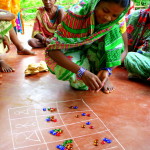Agnes R. Quisumbing, Neha Kumar, and Julia A. Behrman are pleased to provide complimentary access to their article, Do shocks affect men’s and women’s assets differently? Evidence from Bangladesh and Uganda in Development Policy Review. First published online on July 17, 2017, as a PDF file for your own personal use. We encourage colleagues to share >> Read more
Three new publications on measuring women’s control of assets, time use, and agency
Three new papers with IFPRI authors are out as World Bank Policy Research Working Papers: Measuring Ownership, Control, and Use of Assets (Doss, Cheryl; Kieran, Caitlin; Kilic, Talip) Measuring Time Use in Development Settings (Seymour, Greg; Malapit, Hazel Jean; Quisumbing, Agnes R.) Measuring Women’s Agency (Donald, Aletheia Amalia; Koolwal, Gayatri B.; Annan, Jeannie Ruth; Falb, >> Read more
New publication: Gender, Assets, and Agricultural Development: Lessons from Eight Projects
Originally posted on the Gender, Agriculture, and Asset Project (GAAP) website. A new paper co-authored by GAAP PIs and other GAAP1 team members, synthesizing the findings of the 8 impact evaluations of projects which were part of the first phase of GAAP, is now available. The evaluations used mixed methods to show the impact agricultural development programs >> Read more
Takeaways from twenty years of gender and rural development research at IFPRI: Closing gender gaps in agriculture through property rights and governance
The following blog by IFPRI gender experts Sophie Theis, Agnes Quisumbing, and Ruth Meinzen-Dick is the second in a four-part series leading up to the Policy Seminar on "Beijing +20 and Beyond: How Gender Research Is Changing the Landscape of Food Policy," to be held on October 14, 2015 at IFPRI's Washington, DC headquarters. This >> Read more
[UPDATED] Call for concept notes: Gender, Agriculture, and Assets Project (GAAP 2)
The International Food Policy Research Institute has received a second round of support from the Bill & Melinda Gates Foundation to adapt and validate a measure of women’s empowerment that agricultural development projects can use to diagnose key areas of women’s (and men’s) disempowerment, design appropriate strategies to address deficiencies, and monitor project outcomes related >> Read more
Report Release: Measuring Women’s Economic Empowerment and M&E Guidelines
From the Women's Economic Empowerment: A Roadmap website: Design challenges are common to most program evaluations, but this is especially true for programs that measure women's economic empowerment. This is because of the interdependence between women's economic and social roles, which influences their business choices and returns to those businesses. For example, because women have >> Read more
New Post on the PIM EnGendering Data Blog: “Yours, Mine, and Ours” by Agnes Quisumbing
Increasing evidence demonstrates the importance of women’s control and ownership of assets for achieving important development outcomes. Yet, studies focusing exclusively on increasing women’s asset ownership and control, or increasing their ownership of a specific kind of asset, run the risk of missing what else is happening within a household. Does the woman increase control >> Read more
New EnGendering Data blogpost: “Do you own the asset?”
The CGIAR Research Program on Policies, Markets, and Institutions (PIM) has another great post on the EnGendering Data blog. In "Do you own the asset?", R Padmaja and Dr. Cynthia Bantilan of ICRISAT discuss small but critical changes they made to their survey instrument to collect better data on women's asset ownership. Read the full post here, and >> Read more
Publication: Gender, assets, and market-oriented agriculture: learning from high-value crop and livestock projects in Africa and Asia
A new paper synthesizing findings and “lessons learned” from four of the Gender, Assets, and Agriculture projects (LandOLakes, CARE-Bangladesh, HarvestPlus REU, and HKI Burkina Faso) is available online on the Agriculture and Human Values journal website. Abstract: Strengthening the abilities of smallholder farmers in developing countries, particularly women farmers, to produce for both home and the market >> Read more
COP20: Climate change negotiators must consider the role of rural women
Outreach Magazine, a multi-stakeholder magazine on climate and development, has published a series of articles on climate change and gender for COP20, including a new post from Claudia Ringler, Deputy Director of IFPRI's Environment and Production Technology Division, on including women in the current climate change negotiations. She writes: As smallholder farmers in many parts of the world, women play >> Read more

